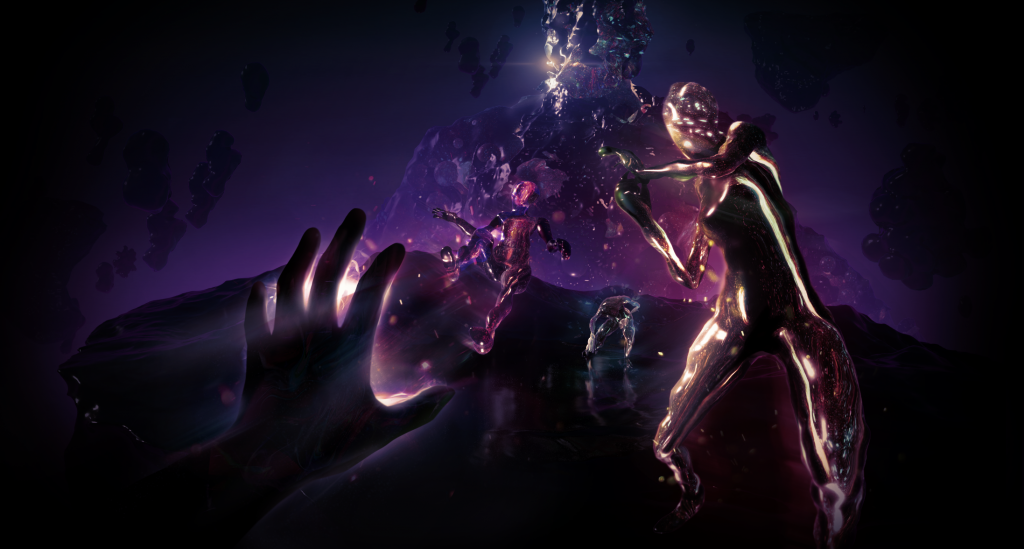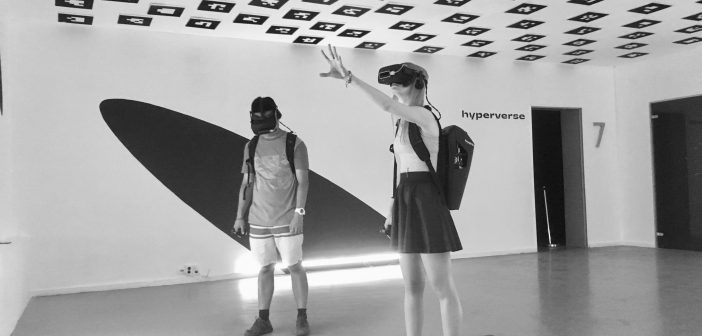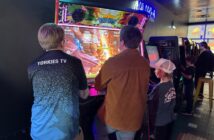VRstudios Makes a PowerPlay
Company Continues to Surprise with Massive D&B Deal, FEC-Focused Management Platform & New Game that Lives Up to the Promise of VR
by Casey Minter
In a barely-charted industry like location-based virtual reality, it’s always a good idea to look for disruptors. Keeping an eye on the companies bringing technology to the forefront that radically shifts the potential of the industry is just common sense, and one of those companies (if they can live up to their hype) looks to be Hyperverse.
The Leibniz-inspired Russian company has taken VR and injected it with a fantastical approach and an exciting, simplified way of tracking players. Co-founder and CEO Roman Mikhailov says his company’s proprietary tracking system cuts expenses while maintaining quality tracking and simple setup.
The tracking system eschews the current industry standard of multitudes of expensive cameras lining an arena, and instead puts one camera in each players backpack. The pack camera points upwards and stays synced thanks to simple paper marks placed on the ceiling.
Beyond cutting down on the massive expense of multiple, high-quality cameras, the system allows for a wholly customizable experience, meaning location owners can transform basically any room into a VR space. This is augmented with a pair of infrared cameras mounted on the ceiling and LEAP motion controllers for hand/arm tracking.
“We’ve basically totally reworked the traditional infrastructure of VR,” said Mikhailov. “It’s very simple, not as much hardware to troubleshoot, buy or replace. It’s easy to move and set up and still maintains a sense of immersion.”
Hyperverse is offering a turnkey set up for locations, and is just starting to turn its attention toward America. They currently have four locations: three in Russia (Moscow, Chelyabinsk and Saratov) and one in Minsk, Belarus. The company grew out of a host of developers who had worked on massive multiplayer online (MMO) games in the U.S., Korea and Russia, and wanted to bring the feel of a realistic yet fantastical world to VR.
 “VR has been my dream since the ’90s, and I’ve always been in the IT/tech world. So, when the Occulus originally came out, I bought it and began tinkering with some friends,” Mikhailov said. “It was a natural progression. We started the company in 2015, built our first prototype in 2016 and raised money from there.”
“VR has been my dream since the ’90s, and I’ve always been in the IT/tech world. So, when the Occulus originally came out, I bought it and began tinkering with some friends,” Mikhailov said. “It was a natural progression. We started the company in 2015, built our first prototype in 2016 and raised money from there.”
Hyperverse claims to have a pinpoint focus on operator needs and quality of life features. Mikhailov says the operator only has about two buttons that are needed to operate a game, once set up is completed. Troubleshooting is similarly simplified, he says, with all the hardware essentially in the backpack, meaning if there’s a problem, the pack can be quickly switched out and the game can continue. There’s little to no need for synchronization, since the hardware is contained to the pack.
The company had a small booth at this year’s Amusement Expo and began to make inroads into the U.S. market. Mikhailov hopes to continue growth and find solid partners in the States to work alongside. He has respectable ambition, hoping to find Hyperverse equipment in at least 20 locations by the end of next year. The company has yet to cut its teeth in long trials, however, and content is limited to two released games with a third in the works. But, Mikhailov says the company is working to ensure Steam games and other third-party games can be compatible with their systems, and also promises that Hyperverse or a third-party will work directly with locations in need of a customized space, ensuring that content will fit in any size or shape room.
Hyperverse’s standard solution is sold as a 1,000-sq. ft. arena that runs around $150,000 for a six-player setup. According to Mikhailov, this allows for 30- to 40-minute games (including a 15 minute suit-up period) that they charge around $30 for. As their location base grows, they hope to link different arenas to allow for upwards of 12 people to play in one game, from different parts of the world. That’s just the tip of the iceberg for Mikhailov though.
“I think the dream is a football field-sized arena with a hundred people playing at the same time, some kind of cyber battle royale with a lot of teams,” Mikhailov mused. “With our system, size becomes a lot less of a restriction.”
As of now, the company’s locations are limited, though they did host demos of the technology and content in high-traffic areas of San Francisco and Los Angeles earlier this year. Regardless, look for their name as they continue to grow, and visit hyperverse.io for more information.




